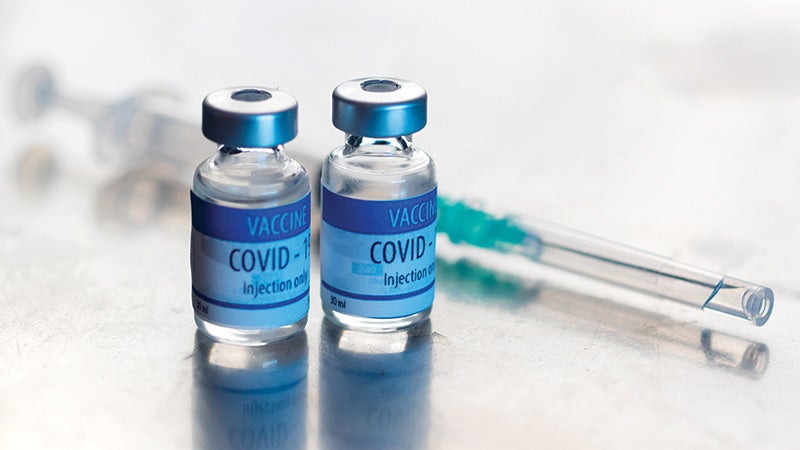Q&A: Local doctor says ‘get vaccinated or get infected’
Published 4:45 pm Wednesday, July 28, 2021
|
Getting your Trinity Audio player ready...
|
With COVID-19 cases and deaths on the rise in Alabama there are increased concerns regarding the state’s low vaccination rate and the health of community and students who are getting ready to return to school without some of the safety guidelines that were in place last year.
As of last week, Alabama was the only state where fewer than 40 percent of eligible residents were fully vaccinated against COVID. At the same time, new cases in Alabama increased by over 500 percent since July 4 and hospitalizations due to COVID rose by over 300 percent.
On Tuesday, the state reported 2,667 new cases of COVID-19, the highest total in six months. The state’s average for new cases is now higher than it was one year ago, according to the Alabama Department of Public Health.
As the school year approaches, the Andalusia Star-News spoke with Dr. Bhagwan Bang about issues related to students and COVID and his message: “Get vaccinated or get infected.”
Q: What are your thoughts on children and the COVID-19 vaccination?
A: I feel strongly that children should be vaccinated. Last year, we did not test children as much as adults. Most of the children were indoors and when school started we were doing masks and social distancing, which I don’t think we will see as much of that this year. Despite all that, at least 400 children died. We also know that MIS-C, a potential life-threatening, COVID-related inflammatory illness, has been reported in children who contracted COVID. We also know that children are a spreader of the disease and the virus can multiple in them. Considering all this, I think children should be vaccinated.
Q: Is there an age when the COVID vaccine would be more appropriate?
A: Right now, it is approved for 12 years and above for Pfizer vaccine. I expect that in September or October we will have vaccine for at least 5 and above and there are studies underway related to children as young as 6 months. Whichever vaccine is approved by the CDC and FDA, depending on age and health status, they should get it.
Q: What are some side effects of the vaccine.
A: One of the things reported besides allergic reactions is inflammation of the heart muscle, especially after the second dose, and that is self-limiting. We need to understand that natural infection also gives 1 in 40 chance of myocartitis (heart inflammation) as compared to 1 in 20,000 chance from the vaccine.
A second concern is related to Guillain-Barré Syndrome (GBS), an inflammatory disorder of peripheral nerves outside the brain and spinal cord. The incidences of this is 1 in 128,000.
There are also some concerns regarding abortion and sterility. Actually, this was started because of the spike protein in some ways resemble the placenta tissue of humans and could inadvertently cause abortion; however, in all the studies nothing like that has happened yet. There was no decrease in the birth rate despite the vaccine used. The vaccine is safe for pregnant and lactating women.
Another concern is blood clots which has been seen in 1 in 500,000 and some reports say natural infection where clotting abnormalities can be detected in 1 in 16.
Most importantly, no vaccine so far has caused longterm side effects that were apparent after the first two months. After the first two months, there are typically no longterm side effects.
Q: Do you feel that the COVID vaccine should be mandated?
A: I think yes, unfortunately. There is always the argument that it is a personal decision. However, if one makes the decision to not get the vaccine and then you transmit the infection to another person, even your wife or unborn babbies, then your personal decision has affected others. You may choose not to get a tetanus vaccine or a rabies vaccine that is your personal choice. But, in this case it will harm others so I do think it should be made mandatory.
Q: If a child has had an allergic reaction to a previous vaccine, should they still receive the COVID vaccine?
A: The ingredients are different. Each vaccine is unique so they can get the vaccine.
Q: Is one of the vaccine products available a better choice for children?
A: My personal choice is the mRNA vaccine. The side effects reported so far were seen more in the Johnson and Johnson and AstraZeneca where as other vaccine has seen very little side effects. But, whichever side effects develop, the chance of developing them is much from a vaccine than from the natural infection of COVID. Parents should consider which vaccines have been approved based on age and health status.
Q: Are there concerns with taking the COVID vaccination within a certain time from traditional vaccinations and boosters?
A: The COVID vaccine can be administered with other vaccines.
Q: Any concerns of children with asthma?
A: Actually, those with conditions like asthma and obesity should get the vaccine as they are at a higher risk of having problems with the COVID-19 virus. Those people should get the vaccine.
Q: Should those who have had COVID still get the vaccine?
A: When you get COVID you should develop a natural immunity. You can argue that they don’t really need it. But, the only question comes is whether there is a down side to getting it? Probably not. One reason to get the vaccine is that we do not know how much of the virus was in a person’s system to get the positive test. There is no reason not to get a vaccine booster as a way to have additional protection.
Q: Should unvaccinated students wear masks and practicing social distancing at school?
A: I think it will be very difficult this year because many states and places are not mandating masks, especially for those who are vaccinated. Generally, if a community is fairly well vaccinated, you have a good herd immunity. In the cases where communities are up to 70 percent or above vaccinated there is a very low level of transmission and there would likely be no need for a mask.
Q: What do feel lies ahead in the fight against COVID-19?
A: This was supposed to be a winter virus, but we are seeing it become very active even in the summer. With winter coming, in combination with the flu and other winter viruses, I’m very concerned what could happen. We may have bigger problems if we let this virus continue to replicate unchecked. The best way we have to fight it is the vaccination.
Early on, I was skeptical myself about getting the vaccine and I understand the concerns. However, after all the data and readings I can safely say that we have two choices: either get vaccinated or get infected and vaccination is always the better choice.
As we know, 95 percent of the people with the severe disease and 99.5 percent of people who have died were unvaccinated. That tells us how well the vaccine is working.
Some people may feel that children are not having problems with COVID. That is like saying, ‘on a rainy day my child did not get wet.’ Well, in this case the child did not get out. If we had no guidelines or vaccine, it is difficult to guess what might have happened. We are clearly seeing those communities with a higher vaccination rate have a lower transmission and mortality rate. We also are seeing more young people contracting the delta variant because they did not get the vaccine Those who do not get the vaccine could contract the virus leading to a greater chance it could develop a variant strain that could be passed on to others.
Some may argue that there is not enough testing on the vaccine. There is never going to be 100 percent safety in anything we do. At what point do we say we have enough evidence to take it? This vaccine has done what it is supposed to do. That means, it prevented the major problems. We’ve yet to see any significant problem after vaccination. Get the vaccine or infection, it is your choice, but receiving the vaccination is better for you and those around you.







